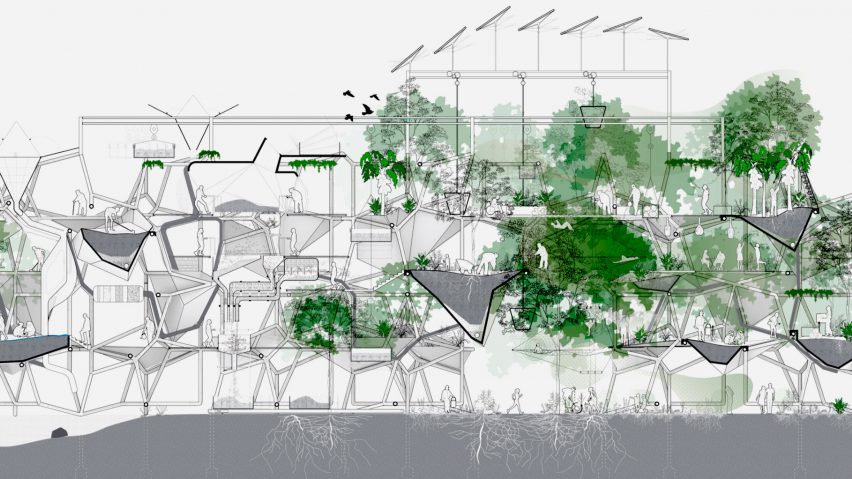
Singapore University of Technology and Design presents ten design projects
Dezeen School Shows: green spaces that are designed to alleviate ageing and a scheme to upcycle technological waste are included in Dezeen's latest school show by students at the Singapore University of Technology and Design.
Also featured are an adaptive reuse design solution that aims to unite Indian farming and craft practices, and a project that reimagines Vietnamese deltas as sites for cities.
Singapore University of Technology and Design
Institution: Singapore University of Technology and Design
Course: Master of Architecture – Architecture and Sustainable Design pillar
Tutors: Daniel Whittaker, Thomas Schroepfer, Eva Castro, Yeo Kang Shua, Carlos Banon, Peter Ortner and Immanuel Koh
School statement:
"This collection of the top ten jury-selected thesis projects from December 2022 are representative of the quality and thoroughness of research, application and intellectual thought brought forward in our Master of Architecture programme at Singapore University of Technology and Design (SUTD).
"Graduate students investigated urban and ecological realms ranging from the South China Sea and the lower Mekong Delta to the east coast city of Chennai, India.
"Localised student thesis projects ask how architecture can elevate the dignity of homeless people, deal with environmental consequences of island expansion through land reclamation and the complexities of economical plastic upcycling and recycling.
"Together, these students' theoretical inquisitions re-assert the role of the architect in crafting an optimistic future, harnessing emergent technology with the craft of building to produce a harmonious future in Singapore and Southeast Asia."
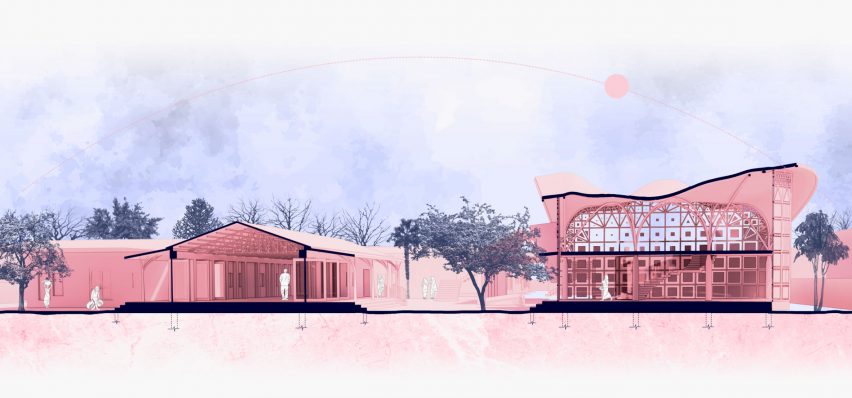
What If? Reimagining Chennai, India's Industrial Legacy by Madhumita Gokuldas Kumar
"Kumar's project proposal seeks to reimagine a scenario where a former industrial estate can be made more accessible to the entire community (and not just cater to the emerging tourist-class with disposable income) by means of an architectural intervention, which serves the needs of the people who inhabit the surrounding dense residential neighbourhood.
"Additionally, it examines how adaptive reuse in Chennai can retain the collective industrial/factory typology and memory of the place, yet bring to it a renewed purpose in the twenty-first century.
"By utilising existing under-used reinforced concrete industrial structures, the added benefit of the reduced carbon cost of new construction can also be obtained.
"Kumar's Master of Architecture thesis project aims to combine crafts and farming, two activities intrinsically associated with Indian villages, as an integrated circular hub for the two."
Student: Madhumita Gokuldas Kumar
Tutor: Daniel Joseph Whittaker
Award: Master of Architecture, Honorary Project Award
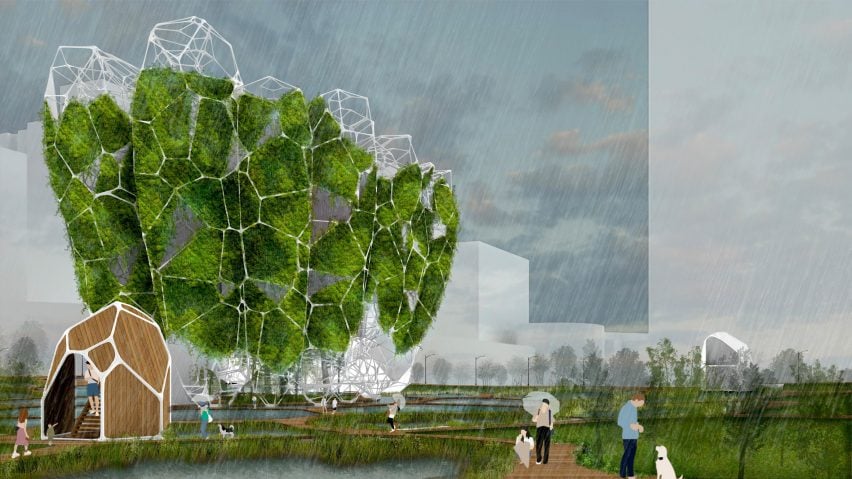
Sponge Building: an urban architectural solution to embrace extreme precipitation by Megan Chor Xin Yi
"Anthropogenic climate change has plagued the world with extreme precipitation that leads to catastrophic flash floods, causing widespread fear and casualties while costing the global economy $82 billion US dollars thus far.
"This problem is amplified in Singapore – a tropical country with naturally abundant rainfall and expensive grey infrastructure that is steadily getting battered by the worsening rain.
"Sponge cities are landscaped solutions comprising of lush vegetation that naturally retains and filters rainwater.
"Yi's Master of Architecture thesis project presents a solution culminating in picturesque urban wetlands that serve as an alternative stormwater management solution, and as a relief to lifeless, water-polluted cities in China."
Student: Megan Chor Xin Yi
Tutor: Thomas Schroepfer
Award: Master of Architecture - Honorary Project Award
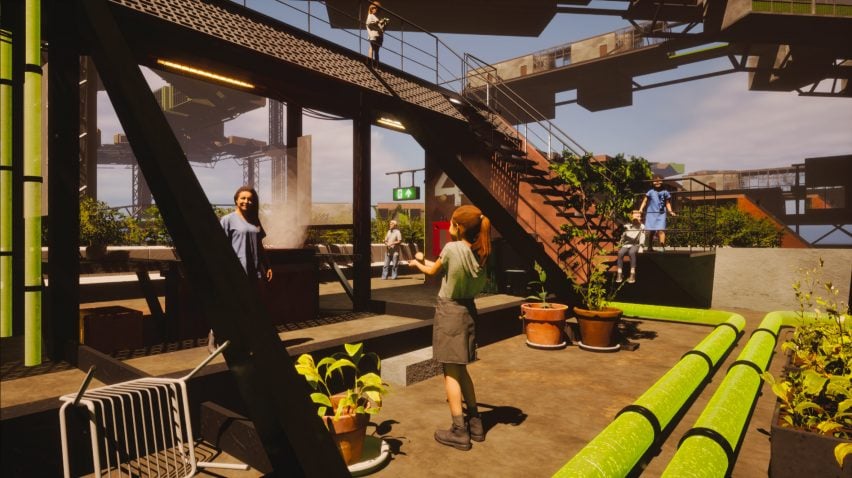
Sinofuturism: Mapping of Oil in South China Sea by Nicholas Lim JunYuan
"JunYuan's thesis project looks into a future scenario. As the world scrambles to build new oil energy infrastructures – both terrestrial and oceanic – economically viable oil reserves are depleted and the world enters another energy crisis.
"China now has a valuable bargaining chip in the form of a new energy source, giving it immense power.
"A mapping of the oil extraction infrastructures explains the power and vulnerability of different Southeast Asian countries in terms of energy.
"The solution proposal: centralisation in the Spratly Islands with requirements, including providing suitable algae growth conditions, be in close proximity to major shipping routes, be centralised to most Southeast Asian countries and China, not intrude into any exclusive economic zones of countries, have sufficient available infrastructure and allow China to have a fair degree of influence.
"JunYuan's Master of Architecture thesis found the location that fulfils all six aforementioned requirements – at the very heart of the South China Sea and its conflict: the Spratly Islands."
Student: Nicholas Lim JunYuan
Tutor: Eva Castro
Award: Master of Architecture Thesis Award - Research and Daniel Libeskind Award
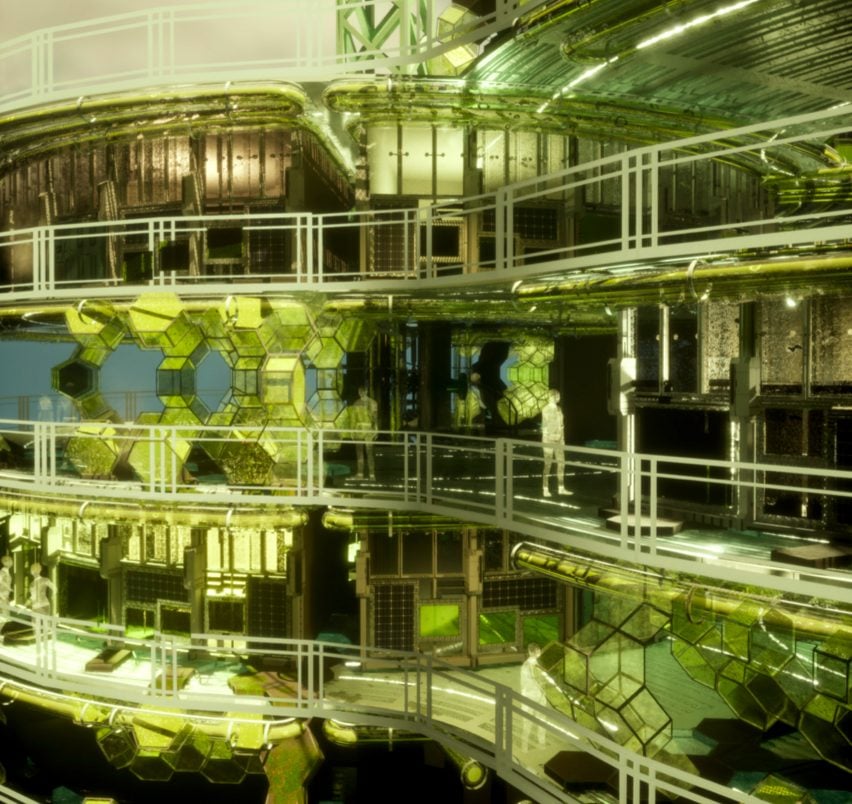
Second Cycles: Sythesis of Techno-Natures by Megan Riri Moktar
"The increasingly complex transboundary flows of used electronics – involving both the global north and south – have shown evidence of missed opportunities, as well as an uneven distribution of socio-environmental risks and responsibilities.
"Working with tools such as narrative, fiction forming, infrastructure and integrated hybrid systems, Moktar's Master of Architecture thesis aims to speculate the future of the waste communities within the larger regional setting of upcycling and recycling in an ever-changing technological landscape, with Thailand as a testing bed.
"As the next generation of high-tech electronics – like solar cells and electric vehicles (EVs) – have become more popular, researchers in Thailand have expected the increase of wasted solar cells and EV batteries.
"In the process of forming this project, the ultimate intention became clear – transforming and remediating sites polluted with hazardous landfills, as well as building a resilient self-sustaining communities in the face of climate change.
Student: Megan Riri Moktar
Tutor: Eva Castro
Award: Master of Architecture Thesis Award - sponsor: DP Architects
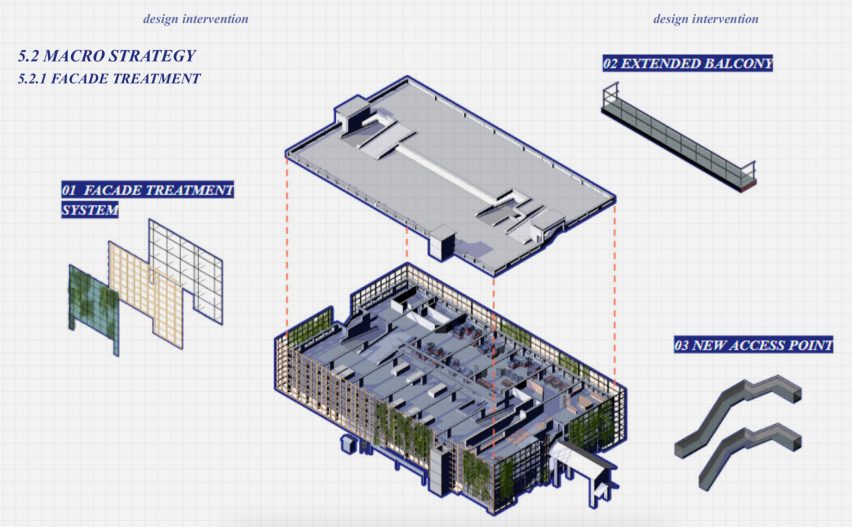
Going Public: Bringing Visibility to the Homeless in Public Spaces by Nurul Nazeera Binte Yazid
"Homelessness exists – even in a first world country like Singapore.
"It is important to understand that homelessness exists due to a multitude of reasons, not just the ones that the media feeds us.
"The project developed a framework for public spaces to be appropriated so that homeless persons will have an option to live with dignity."
Student: Nurul Nazeera Binte Yazid
Tutor: Yeo Kang Shua
Award: Master of Architecture Thesis Award - Social Innovation
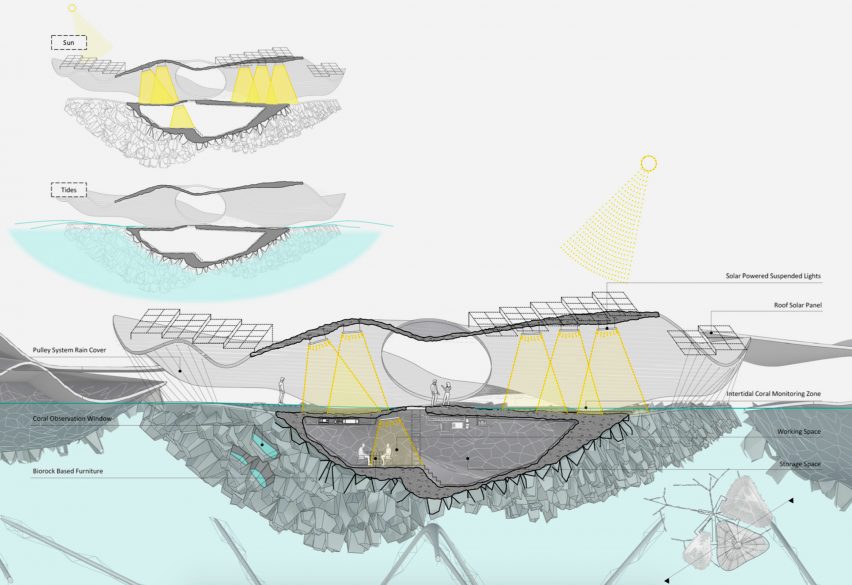
Symbiotic Coast: Coral Based architecture in Singapore's Southern Waters by Eva Yang Funing
"From low rise villages to major sea trading hub between the East and Western countries, there is no doubt that the sea has played a significant role in Singapore's growth as a coastal city.
"As the main material for building seawalls and dikes for coastal defence, concrete is used extensively in traditional land reclamation methods, resulting in a massive carbon footprint on top of the huge construction works required.
"Funing's thesis reimagines an alternative to the current way of living behind the walls by living with the water, in hopes to re-establish our lost connection with the sea as we start to acknowledge it a part of our living environment.
"Looking into biomimicry as a form of inspiration and a nature-based solution, Funing's thesis explores coral reef as a natural coastal defence solution and uncovers ways of accelerating its growth to reach the potential of establishing a new city of grown from the water."
Student: Eva Yang Funing
Tutors: Carlos Banon and Peter Ortner
Award: Master of Architecture Thesis Award - Sustainability

Plastic Perceptions by Ashley Chen Siew Li
"Li's Master of Architecture thesis project seeks to explore architecture as a multi-sensory medium – to unravel the subconscious through the use of artificial intelligence and wearable technologies.
"Electrode placement through newly developed wearable technology focuses on the two main head-scalp locations: the front part of the brain called the prefrontal lobe – in charge of control functions – and the back part of the brain, named the parietal lobe and occipital lobe, which are in charge of sensations.
"Through data interpolation and constructive algorithms, Li's customised programme records the location of the head, the position of the eye and dwell time upon visual stimulus – optically-perceived imagery.
"This mapping exercise determines the focus of this thesis: the digital mapping of one's virtual surroundings to create an even more fulfilling environment in which to inhabit."
Student: Ashley Chen Siew Li
Tutor: Immanuel Koh
Award: Master of Architecture Thesis Award - Computation and Representation
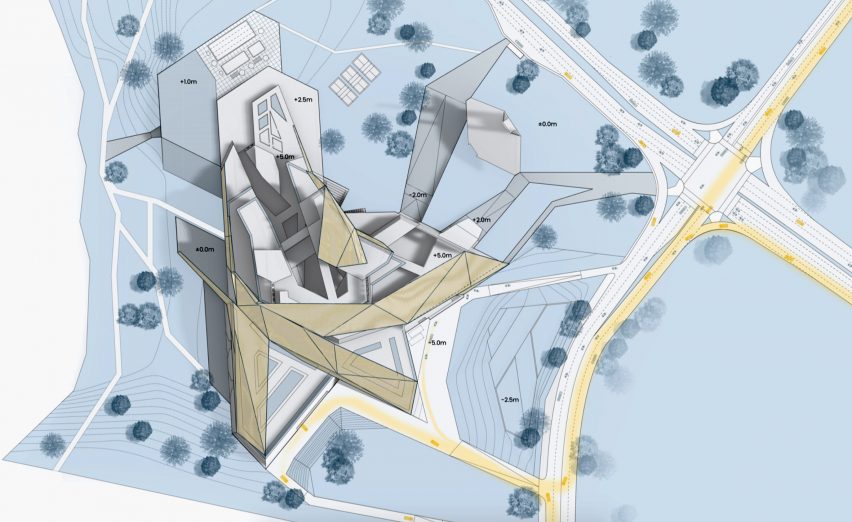
Re:CC Rejuvenating community spaces with recycled plastic construction assemblies and community-focused recycling processes by Natalie Ng Jie Lin
"Natalie's Master of Architecture thesis project asks the question: given the importance of infrastructure and community action in achieving strong recycling rates, is it possible to redesign the waste management infrastructure in Singapore to achieve similar results among the community?
"Apart from high operation and maintenance costs of dedicated plastic recycling facilities, and these constraints restrict the expansion of the plastic recycling industry in Singapore, especially in the neighbourhoods.
"Therefore, this thesis explores the potential of a community-focused recycling centre to address the nation's low recycling rates.
"The intervention destigmatises the waste management processing by adding value to the surrounding neighbourhood, and it seeks to raise awareness of sustainable resource consumption by increasing the interaction with recycling processes and the daily activities of the community."
Student: Natalie Ng Jie Lin
Tutors: Carlos Banon and Peter Ortner
Award: Master of Architecture - Honorary Project Award
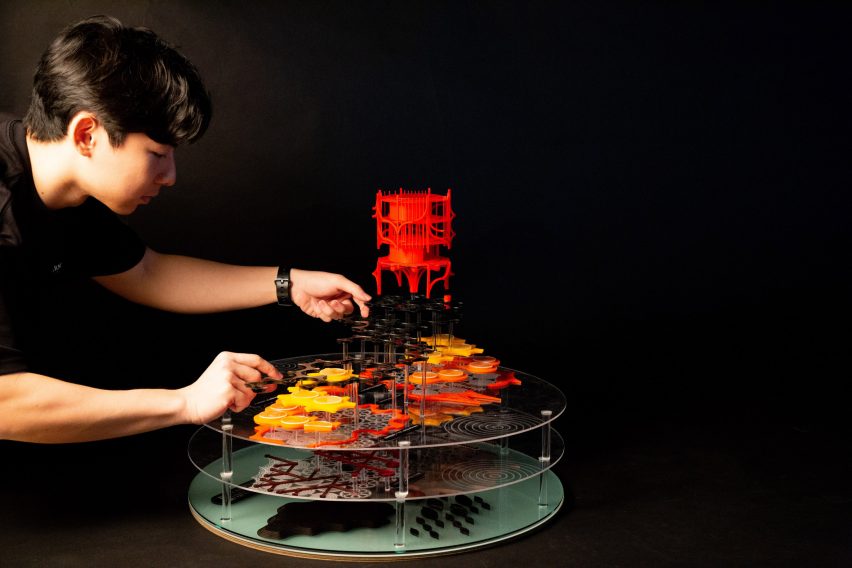
Delta Reimagined: Towards Salinicity by Melvin Wong Weijie
"Weijie's Master of Architecture thesis project speculates a mitigative and adaptive transition of the modern Vietnamese delta into a reimagined future delta system.
"The productive ecosystems will be largely dependent on salt in seawater as a resource and through a time-based approach see through the incorporation of brackish, saline-based systems.
"It acknowledges that existing delta deterioration – sinkage and shrinkage – is largely influenced by a multitude of factors, both climatic and anthropogenic.
"Hence, the thesis will pivot from a trigger point when upstream communities decide to cut damming and remove existing dams from the Ba Tai and Ben Tre South Mekong Delta System.
"In the near future, there will come a time when the two process are incorporated and this leads to the formation of the City of Salinity."
Student: Melvin Wong Weijie
Tutors: Eva Castro
Award: Master of Architecture - Honorary Project Award
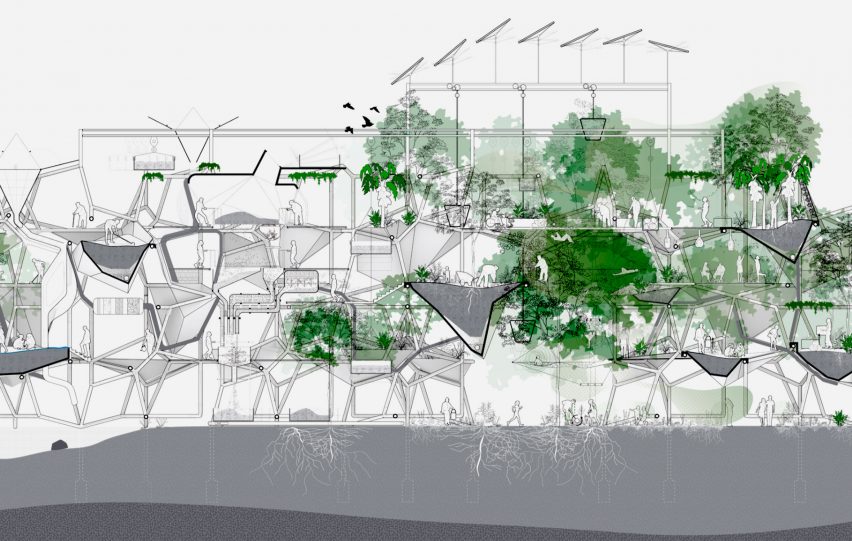
Landscape of Care by Koh Fang Yun
"Tapping into the transformative potential of people-plant interactions to achieve optimal population health, Fang Yun's Master of Architecture thesis project looks to transform urban green spaces, frequently aestheticised and limited in functionality, into intensive rehabilitative assemblies in the context of high-density urban living.
"Straddling both culture and environment, urban green spaces are prime to be redesigned as the upkeep of health and well-being becomes ever more pertinent with an ageing population.
"Through intensification in the quantity and quality of urban green spaces close to the home, not only are traditional notions of environmental aesthetics disrupted, the agency to better health and well-being is returned to the individual and community.
"Fang Yun's thesis postulates a new processual landscape of health integrated into the existing environment to support health and well-being."
Student:Koh Fang Yun
Tutors: Christine Yogiaman
Award: Master of Architecture - Honorary Project Award
Partnership content
This school show is a partnership between Dezeen and the Singapore University of Technology and Design. Find out more about Dezeen partnership content here.